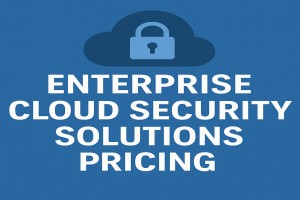Enterprise Cloud Security Solutions Pricing: Complete Guide with Costs, Benefits, and Insights Full Specification

Category: News
-
Sub Category: BANGLADESH
Enterprise Cloud Security Solutions Pricing: Complete Guide with Costs, Benefits, and Insights
One of the most critical questions enterprises face is: How much do enterprise cloud security solutions cost?
The truth is, there’s no one-size-fits-all answer. Pricing depends on various factors such as business size, industry compliance requirements, deployment models, and advanced features like AI-driven threat detection. In this detailed guide, we’ll break down everything you need to know about enterprise cloud security solutions pricing, helping you make an informed decision.
Understanding Enterprise Cloud Security Solutions
Enterprise cloud security solutions are a suite of technologies, services, and policies designed to protect an organization’s cloud infrastructure from cyber risks. They typically include:
-
Identity and Access Management (IAM)
-
Data Loss Prevention (DLP)
-
Cloud Security Posture Management (CSPM)
-
Firewall-as-a-Service (FWaaS)
-
Zero Trust Network Access (ZTNA)
-
Encryption & Key Management
-
Threat Intelligence & Monitoring
These solutions are essential to ensure compliance, data privacy, and resilience against modern cyberattacks.
Factors Influencing Enterprise Cloud Security Solutions Pricing
Pricing can vary drastically depending on multiple elements. Let’s explore the primary factors:
1. Business Size and User Count
-
Small businesses may pay per user, starting as low as $10–$30 per user per month.
-
Large enterprises often require enterprise-grade licensing, costing tens of thousands of dollars annually.
2. Deployment Model (SaaS, IaaS, Hybrid)
-
SaaS Security Solutions: Lower upfront cost, subscription-based.
-
On-Premise with Cloud Integration: Higher upfront investment, ongoing maintenance fees.
-
Hybrid Models: Customized pricing, often more expensive due to integration costs.
3. Features and Security Layers
Basic plans cover essentials like IAM and encryption. Advanced solutions with AI-based threat detection, zero-trust models, and automated compliance reporting come at premium pricing.
4. Industry Compliance Needs
Organizations in healthcare, banking, or government sectors face strict compliance requirements (HIPAA, GDPR, PCI-DSS). This adds cost for specialized solutions and audits.
5. Vendor Reputation and Support Services
Premium vendors such as Palo Alto Networks, Cisco, or Microsoft Azure Security typically charge higher fees compared to smaller providers.
Typical Pricing Models
Enterprise cloud security vendors usually follow one of these pricing structures:
1. Subscription-Based (Pay-as-You-Go)
-
Billed monthly or annually.
-
Ideal for scalability and budget predictability.
-
Price range: $5 to $50 per user/month.
2. Tiered Plans
Vendors often offer Basic, Standard, and Enterprise plans.
-
Basic: Limited features (around $100–$500/month).
-
Enterprise: Full-stack solutions ($2,000+/month).
3. Custom Enterprise Licensing
-
Tailored for large organizations.
-
Pricing depends on user base, features, and global deployment.
-
Can exceed $100,000 annually.
4. Consumption-Based Pricing
Charges depend on usage volume (e.g., data processed, storage secured).
-
Typically $0.10 to $0.50 per GB of secured traffic.
Average Cost Breakdown of Enterprise Cloud Security Solutions
-
Identity and Access Management (IAM): $3–$10 per user/month
-
Firewall-as-a-Service (FWaaS): $1,000–$5,000/month
-
Cloud Security Posture Management (CSPM): $2,000–$15,000 annually
-
Zero Trust Security: $20–$50 per user/month
-
Advanced Threat Detection: $10,000–$50,000 annually
Cost Comparison: SMB vs Enterprise
For Small-to-Medium Businesses (SMBs):
-
Monthly cost: $500–$5,000
-
Focus on IAM, encryption, and basic firewall solutions.
For Large Enterprises:
-
Monthly cost: $20,000–$100,000+
-
Full-stack, AI-powered, zero-trust architectures with global coverage.
Hidden Costs to Consider
While headline prices look attractive, businesses should be aware of additional costs:
-
Implementation & Setup Fees
-
Employee Training
-
Third-Party Integrations
-
Continuous Compliance Audits
-
Incident Response Costs
Benefits of Investing in Cloud Security Solutions
Even though enterprise cloud security pricing may seem steep, the cost of a data breach is far higher. According to IBM’s 2024 report, the average cost of a data breach reached $4.45 million.
Key benefits include:
-
Protection against ransomware and insider threats.
-
Ensured compliance with legal requirements.
-
Improved customer trust and brand reputation.
-
Business continuity and disaster recovery readiness.
Leading Vendors in Enterprise Cloud Security
Some of the top global vendors include:
-
Microsoft Azure Security
-
Palo Alto Networks (Prisma Cloud)
-
Cisco Umbrella
-
McAfee MVISION Cloud
-
Check Point CloudGuard
-
CrowdStrike Falcon
Each vendor has unique pricing models, features, and target industries.
How to Choose the Right Cloud Security Solution
-
Assess Your Needs: Evaluate data sensitivity, compliance requirements, and user base.
-
Compare Pricing Models: Subscription vs. enterprise licensing.
-
Evaluate Vendor Reputation: Look for industry leaders with strong customer support.
-
Test Before Buying: Opt for free trials or pilot programs.
-
Plan for Scalability: Ensure the solution can grow with your business.
FAQs on Enterprise Cloud Security Solutions Pricing
Q1. What is the average cost of enterprise cloud security solutions?
A: Costs range from $500 per month for SMBs to $100,000+ per month for large enterprises.
Q2. Why do cloud security solutions vary so much in price?
A: Pricing depends on factors like user count, compliance requirements, deployment models, and advanced features.
Q3. Are subscription-based security models cheaper?
A: Yes, they’re more cost-effective upfront, but enterprise licensing offers long-term scalability.
Q4. Can I get cloud security for free?
A: While some providers offer free trials, robust enterprise-grade security always comes at a cost.
Q5. How do I calculate the total cost of ownership?
A: Include licensing, setup, employee training, integrations, and ongoing monitoring.
Q6. Is enterprise cloud security worth the investment?
A: Absolutely—considering the rising threat landscape and the multi-million-dollar cost of breaches.
Conclusion
When it comes to enterprise cloud security solutions pricing, businesses must recognize that costs are not just expenses—they’re investments in resilience, compliance, and trust. While SMBs may manage with entry-level plans starting from a few hundred dollars per month, enterprises require robust, multi-layered security often costing tens of thousands monthly.
The key lies in aligning pricing with actual needs, industry compliance, and scalability. With cyber threats becoming more sophisticated daily, investing in enterprise cloud security is not optional—it’s a necessity.